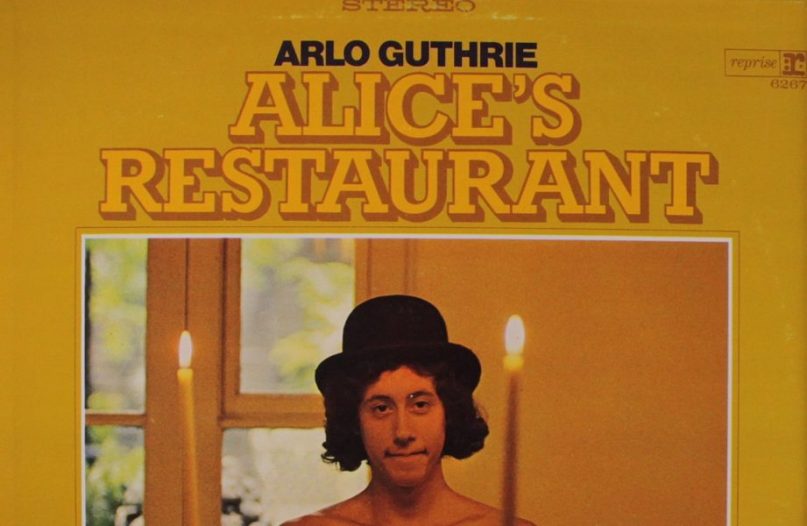You want to feel old?
This is the fiftieth anniversary of the song “Alice’s Restaurant,” by Arlo Guthrie.
Well, sort of. The song was released on the album of the same name in September, 1967. The events that the song commemorates actually occurred two years before that, on Thanksgiving, 1965.
But, nevertheless, if you are of a certain age, nothing says Thanksgiving more than “Alice’s Restaurant.”
For those of you who don’t know what I am talking about, here is a Cliff’s Notes version.
“Alice’s Restaurant” consists of Arlo Guthrie delivering a long, guitar-accompanied monologue (a talking blues, really — an art form that his father, the iconic American folk singer, Woody Guthrie, had perfected) about his arrest for littering in Stockbridge, Massachusetts, by the Stockbridge chief of police, William Obanhein, a.k.a. Officer Obie.
At the time, Arlo was living with Alice and Ray Brock in a deconsecrated church in Great Barrington, Massachusetts (more about that later).
Ultimately, as the song’s second part tells us, Arlo’s arrest record was at least partially responsible for preventing him from being drafted and serving in the war in Vietnam.
Two years later, the movie “Alice’s Restaurant” was released. It stars Arlo as himself.
Jewish geography lesson: For many years, I spent summers in the Berkshire mountains of western Massachusetts, where the song takes place. For me, and for so many, the Berkshires are a magical place — the only place where I ever truly relax.
The discerning tourist can find all of the places mentioned in the song (with the exception of the scenes at the draft board, which take place on Whitehall Street in New York City).
- In Stockbridge, you can visit the original location of Alice’s restaurant; it is, in fact, “around the back, just a half a mile from the railroad track” off Main Street.
- For many summers, I used to dump our trash at the Stockbridge town dump, which is probably where Arlo should have dumped his trash in the first place. I could do that, legally, because I had a sticker from the “master garbologist.”
- Officer Obie’s extended family still lives in the area; he was a well-known and beloved figure.
As for the church, it is still there, as well. It serves as the Guthrie Center, a wonderful concert venue, and home to the Guthrie Foundation, a permanent memorial to the legacy of Arlo’s late parents.
(Check out this song about Woody’s legacy, written and sung by my friend, Doug Mishkin).
Which brings me to the Jewish stuff.
Arlo Guthrie is Jewish, through his mother, Marjorie Mazia Guthrie.
Fun fact: when Arlo celebrated becoming bar mitzvah, at the Howard Beach Jewish center in Queens, the presiding rabbi was none other than Meir Kahane.
Kahane would go on to become the leader of the Jewish Defense League, and then, in Israel, of the extreme right wing, anti-Arab Kach party.
Kahane was assassinated in 1990 by El Sayyid Nosair, who was linked to Osama bin Laden — thus becoming the first American victim of Al Qaida.
Arlo Guthrie and Meir Kahane — together. Think of it.
Back to Woody Guthrie.
Guthrie was not Jewish, and yet, he wrote a bunch of Hanukkah songs. This one is one of my favorites.
Guthrie’s guitar was adorned by a simple message, placed there in 1941: “This machine kills fascists.”
As we prepared to enter World War Two, it was the right message.
And, while we are not fighting foreign wars against fascists right now, the anti-fascism sentiment still stands.
One last thing about Woody Guthrie.
When Guthrie lived in Brooklyn, he lived at the Beach Haven apartments, which was a property that had been developed by Fred Trump — as in the father of the current president.
As others have noted, the older Trump was not particularly interested in having blacks rent his properties.
Which would lead Woody Guthrie to write a song about Fred Trump:
I suppose Old Man Trump knows
Just how much racial hate
he stirred up in the bloodpot of human hearts
When he drawed that color line
Here at his eighteen hundred family project.
The spirit of protest, birthed by Woody Guthrie and sustained by Arlo, is still alive in our time.
And for this, we surely must give thanks.






